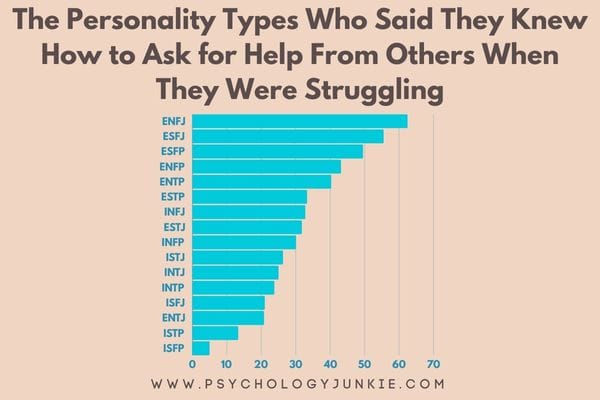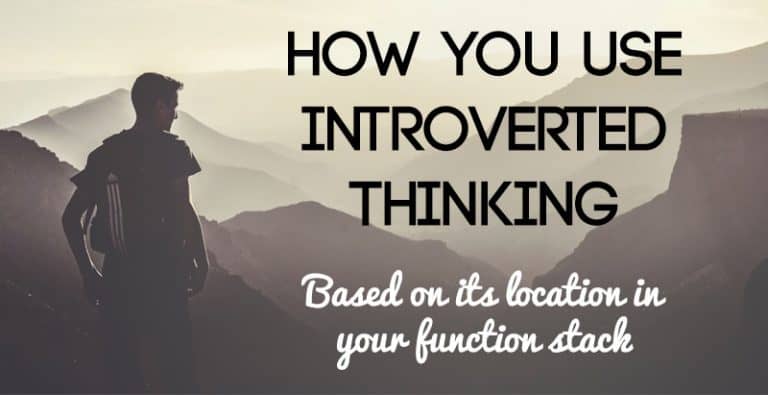The Personality Types That Struggle the Most to Ask for Help
When life gets overwhelming, some people instinctively reach out for help. They pick up the phone, send a text, or look someone in the eye and say, “I need you right now.” For others, though, asking for help feels like trying to scale Mount Everest barefoot. It’s daunting, uncomfortable, and maybe even a little embarrassing.
I wanted to understand why this is the case—why some of us are naturally wired to seek support and others silently soldier on. So, I surveyed over 80,000 people across the 16 Myers-Briggs personality types, asking a variety of questions related to how they handle stress. One of the statements I asked them to address was this: “When I’m stressed, I know how to ask others for help.” They could answer “Yes,” “No,” or “I’m not sure.”

The results were fascinating (and a little heartbreaking). If you’d like to add your voice to the survey, you can share your opinion here.
The highest percentage of “yes” responses came from ENFJs, known for their people-oriented nature and empathy. At the other end of the spectrum, ISFPs—more soft-spoken and individualistic—barely raised their hands, with only 5% admitting they ask for help when stressed. That’s quite the range!
Why does this matter? Because asking for help isn’t just a survival skill—it’s a lifeline to better mental health, stronger relationships, and connection. When we bottle everything up, stress doesn’t magically disappear. It festers. And the longer we let it stew, the harder it becomes to reach out, even when we’re drowning.
But let’s get real: asking for help isn’t always easy. It doesn’t come naturally to everyone, and that’s okay. There are often deeply ingrained fears and beliefs holding us back, from the fear of looking weak to the dread of being rejected.
So let’s dig into the results of the survey and find out which types struggled the most with asking for help, and why!
If you’re more interested in video, you can also check out the YouTube video I made about this same survey below:
Not sure what your personality type is? Take our personality questionnaire here. Or you can take the official MBTI® here.

The Myers-Briggs® Types Most Likely to Stay Silent Under Stress
Table of contents
#1: The ISFP
ISFPs are the types who struggle the most to ask for help. Only 5% of the 121 ISFPs that responded to the questionnaire said that they knew how to ask for help when they were stressed. Why would this be?
ISFPs are individualists to the core. While they are deeply feeling and value their relationships, they’re also guarded about their inner selves and their deeper feelings. It takes a lot for them to feel that they can trust someone well enough to share their hearts with them.
Carl Jung, a Swiss psychoanalyst and the father of psychological type, wrote of Introverted Feeling (IxFP) types:
“”Still waters run deep” is very true of such women (he referred to Introverted Feeling types as women, even though many were men). They are mostly silent, inaccessible, hard to understand.”
Isabel Briggs-Myers said of the Introverted Feeling types:
“(They) have feelings that are deep but seldom expressed, because inner tenderness and passionate conviction are both masked by reserve and repose.”
You see, ISFPs tend to keep their inner world under wraps. While they may appear quiet, gentle, and accepting, there’s a lot more to them than meets the eye. And a lot of what they go through they keep internalized. I’ve known several ISFPs who have spoken about keeping to themselves even as children, not expressing their true feelings or needs to their families.
Here’s how one ISFP respondent put it: “I just don’t feel like people are going to get what I’m going through, and expressing it all is exhausting.
ISFPs feel things deeply—we’re talking Mariana Trench-levels of deep—and sometimes those emotions are so layered and intricate that putting them into words feels impossible. Couple that with their desire for independence and their knack for figuring things out on their own, and it’s no wonder they rank at the bottom for asking for help.
Why They Struggle to Ask for Help:
- Fear of Misunderstanding: ISFPs’ emotions and values are so personal that the idea of someone misinterpreting them can feel crushing. “What if they think I’m being dramatic? Or worse, what if they just don’t get it?” is a common thought loop.
- Desire for Independence: ISFPs are big on self-reliance. They don’t want to depend on anyone—they want to know they can stand on their own two feet. (Even if those feet are tired and could really use a break.)
- Sensitivity to Judgment: Because their values are so central to who they are, the thought of someone questioning or dismissing their feelings can feel like a personal attack. It’s safer to keep things locked up inside than risk that kind of pain.
Pointers for ISFPs:
- Choose Your People Wisely: Let’s be real—if you’re going to open up, it has to be with someone you trust, someone who won’t stomp all over your feelings like a toddler on bubble wrap. Start with that one friend or family member who’s proven they can hold space for your emotions without judging or dismissing them.
- Ease Into It: You don’t have to dive into the deep end right away. Instead of saying, “My life is falling apart and I’m drowning,” start with something like, “Hey, could you help me brainstorm some ideas for this situation I’m dealing with?” Small steps are all it takes.
- Write It Down First: ISFPs often express themselves beautifully through creative outlets. If you can’t figure out how to say it, write it. Scribble it out in a journal, sketch it, even type it into a note on your phone. Sometimes, getting your thoughts out in a tangible way makes them easier to share.
- Reframe Asking for Help: This one’s a game-changer. Think of it not as burdening someone but as giving them a chance to support you. You know how good it feels when you help someone you care about? Let them feel that too.
Find out more about ISFPs: Why ISFPs Need Freedom to Thrive
#2: The ISTP
ISTPs are the type of people who look at a problem and think, “I’ve got this.” Whether it’s fixing a car, navigating a computer virus, or figuring out how to get their cat out of the ceiling (yes, I knew an ISTP who had to do this), they’re masters of self-reliance. Only 13.33% of the ISTPs who took my survey said they knew how to ask for help when they were stressed. Why? Because, usually, it’s just faster for them to deal with the problem on their own.
As an example, let’s look at John Wick from the blockbuster movie series. This guy oozes ISTP energy: cool, resourceful, and laser-focused on solving problems (even if those problems involve a room full of assassins). Now imagine John Wick asking for help: “Hey, can you give me a hand here? I’m feeling overwhelmed.” Nope. Not gonna happen.
That’s the ISTP for you—hyper-capable, action-oriented, and allergic to emotional vulnerability. One ISTP respondent put it perfectly:
“By the time I explain what I need help with, I’ve already solved it. Or decided it’s not worth the effort.”
ISTPs lean on their Extraverted Sensing (Se) to notice details and react quickly, paired with Introverted Thinking (Ti) to analyze the situation and figure out the most efficient solutions. Asking for help feels… inefficient. Why waste time when they can troubleshoot it themselves?
But here’s the thing: ISTPs feel stress too. They’re not robots (even if they sometimes act like one in crisis mode). That stress builds up, and when it does, going solo can lead to burnout or missed opportunities to actually solve the problem faster with a little help.
Why They Struggle to Ask for Help:
- Efficiency Over Everything: ISTPs don’t want to waste time explaining something to someone who might not even understand what’s needed. Asking for help feels like adding more steps to a process they’re already handling.
- Independence Is Their Thing: They take pride in being self-reliant. Needing someone else? That’s just not how they see themselves.
- Avoiding Emotional Messes: Let’s be honest, ISTPs aren’t here for the touchy-feely stuff. If asking for help means navigating a minefield of emotions, they’d rather just not.
Pointers for ISTPs:
- Think of It Like a Tactical Move: Asking for help doesn’t mean you’re weak—it’s a smart strategy. Even John Wick occasionally works with allies (hi, Winston and The Bowery King). Think of it as assembling your team to tackle the mission.
- Stick to the Facts: You don’t have to pour your heart out. Start with something practical: “I need another set of eyes on this” or “Can you hold this while I fix it?” That keeps things simple and action-focused.
- Remember: Efficiency Includes Others: Sometimes, the fastest way to solve a problem isn’t going it alone. Fresh perspectives, extra hands, or even just moral support can make a big difference.
Find out more about ISTPs: 24 Signs That You’re an ISTP, the Vigilante Personality Type
#3: The ENTJ
ENTJs are the go-getters of the Myers-Briggs world—the CEOs, the leaders, the “let’s get this done now” types. If there’s a problem, they’re not sitting around waiting for someone to fix it; they’re already three steps into their plan. Out of the ENTJs who took my survey, only 20.83% said they knew how to ask for help when stressed. Why? Because asking for help feels a little like relinquishing control, and that’s… well, that’s not their thing.
Here’s how one ENTJ respondent described it: “I’m good at delegating and organizing people, but if I’m stressed, it’s going to sound more like barking orders. That always backfires. And emotional support? Not something I know how to ask for. I’m gonna deal with that on my own.”
And honestly, that’s the ENTJ struggle in a nutshell. They have a high bar for competence (their own and everyone else’s), and they don’t want to risk slowing things down by handing part of the reins to someone who might not meet their standards. ENTJs know how to delegate and get people involved when there’s a problem to solve. But when it comes to emotional stress or overwhelm, they’re more likely to pull away or try to sweep it under the rug so they can focus on problem-solving. Over time this can lead to a grip stress reaction that only makes things worse. Learning to lean into relationships when times get hard rather than feeling like you’ve got to do everything yourself is one way to really improve your well-being as an ENTJ.
Why They Struggle to Ask for Help:
- Control Is Their Comfort Zone: Asking for help means letting go of the steering wheel, even if just a little. That’s a hard sell for ENTJs, who like being in charge.
- High Standards, All the Time: They expect a lot of themselves, and they expect a lot of others. Asking for help can feel like admitting defeat.
- They Don’t Want to Appear Weak: ENTJs pride themselves on being capable and competent. Admitting they need help can feel like showing vulnerability, which they’re not always comfortable with.
Pointers for ENTJs:
- Think Like a CEO: The best leaders know that delegation is power. Asking for help isn’t admitting defeat; it’s a tactical move that lets you focus on the big picture.
- Trust Is an Investment: Start by delegating smaller tasks to people you trust. Over time, you’ll build confidence in their abilities—and maybe even realize that others can meet (or exceed) your expectations.
- Recognize Strength in Vulnerability: Being honest about your limits doesn’t make you weak; it makes you relatable and authentic. People will respect you more for admitting when you need support.
#4: The ISFJ
ISFJs tend to work behind the scenes to make the world a better place, one detail at a time. They’re the ones quietly holding everything together, making sure everyone around them is okay—even when they’re running on fumes. Out of the ISFJs who took my survey, only 21.05% said they knew how to ask for help when stressed. Why? For most of the ISFJs who commented, it was because they didn’t want to be a burden.
ISFJs are nurturers by nature. They’re the ones who bring you soup when you’re sick, remember your favorite comfort food, and notice when you’re having a bad day before you even say a word. But when it’s their turn to need something? They freeze. One ISFJ respondent put it like this: “I don’t want to be a burden. Other people have enough to deal with.”
Why They Struggle to Ask for Help:
- Fear of Burdening Others: ISFJs don’t want to feel like they’re adding to anyone’s plate. They worry that asking for help will inconvenience or overwhelm the people they care about.
- Identity as a Caregiver: They see themselves as the helpers, not the helped. Asking for support feels like flipping the script, and that can feel uncomfortable—or even selfish.
- Difficulty Prioritizing Their Needs: ISFJs are so focused on others that they can lose sight of their own needs. By the time they realize they need help, they’re often too drained to ask for it.
Pointers for ISFJs:
- Think of It as a Gift: Asking for help isn’t selfish—it’s giving others the chance to show their care for you. The people who love you want to help; they just need to know how.
- Start Small: You don’t have to unload everything at once. Begin with something simple, like asking for help with a specific task. It’s a low-pressure way to practice reaching out.
- Remind Yourself You’re Worth It: You spend so much energy taking care of others—it’s okay to let someone take care of you for a change. Your needs matter, too.
#5: The INTP
INTPs are the thinkers, the idea generators, the philosophers of the personality world. They love exploring concepts, analyzing possibilities, and solving problems from every angle. But asking for help? Yeah, not so much. Out of the INTPs who took my survey, only 23.81% said they knew how to ask for help when stressed.
Here’s how one INTP respondent explained it: “I usually feel like I can figure it out if I just think about it long enough. Plus, people tend to overcomplicate things.”
INTPs rely on their Introverted Thinking (Ti) to analyze problems and their Extraverted Intuition (Ne) to brainstorm creative solutions. Asking for help feels unnecessary when they’re confident they can solve the issue with enough time and mental energy. And looking for help in an emotional context can feel vulnerable and awkward. Many INTPs want the connection and security of having a confidante but struggle to express their emotions. I’ve spoken to quite a few INTPs who want more emotional support during hard times, but find heart-to-heart conversations exhausting as they struggle to find the words to even define what they are going through.
Why They Struggle to Ask for Help:
- They Love Problem-Solving: INTPs enjoy the process of figuring things out on their own. Asking for help can feel like skipping the fun part.
- Distrust of Simplistic Solutions: INTPs often worry that others won’t see the nuance or complexity of a problem, leading to subpar advice or solutions.
- Discomfort With Emotional Vulnerability: Like other introverted thinkers, INTPs struggle to express their emotions. They worry that they’ll say the wrong thing, be too vulnerable, or get drained by the process.
Pointers for INTPs:
- Frame It as a Thought Experiment: Think of asking for help as gathering more data. You’re not giving up control; you’re expanding your knowledge base.
- Set Boundaries: Be clear about what kind of help you’re looking for. For example, “I’m stuck on this part—can you give me a fresh perspective?” keeps the focus on the problem, not the person.
- Practice Reciprocity: Remember that asking for help doesn’t just benefit you—it also gives others a chance to share their expertise.
- Start Small: Begin by seeking input on low-stakes issues. Once you see the value of collaboration, it’ll become easier to ask for help with bigger challenges.
Discover more about INTPs: The Dark Side of the INTP Personality Type
#6: The INTJ
INTJs see the big picture like a chessboard, always planning three moves ahead. We’re wired to think about the future and prepare for likely catastrophes. But asking for help? That’s not really part of our playbook. Out of the INTJs who took my survey, only 25.04% said they knew how to ask for help when stressed. Why? Well, for one, INTJs can be control freaks. We like to figure things out on our own and we crave autonomy in just about everything. If we hand over the reigns, will someone mess it up? That’s a real concern.
Another concern for INTJs is being vulnerable; they don’t like it. They’re the strategizers, the planners, the “I’ve already foreseen this problem 6 months ago and developed a solution” types. Asking for help can feel like admitting failure, or it can just feel too emotionally revealing.
One INTJ respondent summed it up well: “Most of the time, people just get in the way. If I ask for help, it’s because I’ve exhausted every other option.”
INTJs rely on their Introverted Intuition (Ni) and Extraverted Thinking (Te) to analyze patterns, anticipate outcomes, and devise efficient solutions. They trust their own judgment and often assume that they’ll do the job better than anyone else.
Why They Struggle to Ask for Help:
- Confidence in Their Abilities: INTJs trust their insights and strategies. They often feel that involving others will slow things down or dilute the quality of the outcome.
- High Standards: INTJs expect a lot from themselves and others. If they suspect someone won’t meet their expectations, they’d rather not bother.
- Discomfort With Dependence: Asking for help feels like relinquishing control, which doesn’t sit well with a type that thrives on autonomy and self-direction.
Pointers for INTJs:
- Delegate With Precision: Think of asking for help as outsourcing a task. Be specific about what you need and why, and trust that you’ve chosen the right person for the job (this is something your Extraverted Thinking side is good at).
- Focus on Long-Term Gains: Asking for help now might save you time and energy later. It’s a small investment for a greater payoff.
- Practice Letting Go: Start with low-stakes situations to build your comfort level with delegation. Over time, you’ll learn that sharing the load doesn’t mean losing control.
You might also like: 12 Stress-Busting Techniques for INTJs
#7: The ISTJ
ISTJs are the steady, reliable types who like having a plan for everything and a steady routine. Out of the ISTJs who took my survey, only 26.32% said they knew how to ask for help when stressed. Why? Because for ISTJs, asking for help feels like admitting they didn’t plan well enough—and that doesn’t sit right with them.
Here’s how one ISTJ respondent put it: “It’s not that I don’t need help sometimes, but I feel like I should’ve been able to prevent the problem in the first place.”
ISTJs live by their Introverted Sensing (Si) and Extraverted Thinking (Te), which means they focus on past experiences and logical, actionable solutions. “What did I do last time to solve this?” will be going through their head. And if it’s a new problem, they’re going to define the scope, logically organize what went wrong, determine their prioritize, and and look for efficient solutions. Asking for help can feel like a detour, and they may doubt others’ abilities to handle the problem as well as they can.
Why They Struggle to Ask for Help:
- They Value Preparedness: ISTJs pride themselves on being ready for anything. Asking for help feels like admitting they missed something in their preparation.
- They’re Highly Independent: Self-reliance is a cornerstone of the ISTJ identity. Depending on someone else feels risky, especially if that person doesn’t follow through.
- Discomfort With Vulnerability: ISTJs aren’t fans of drawing attention to themselves, especially in moments of stress. Asking for help feels a little too personal for their liking.
Pointers for ISTJs:
- Reframe It as a Contingency Plan: Think of asking for help as part of your overall strategy. It’s not a failure; it’s a backup option to ensure success.
- Start With Trusted People: Find someone whose reliability matches your own. Knowing you can count on them will make the process feel less risky.
- Remember, Nobody’s Perfect: Even the most prepared people encounter unexpected challenges. Asking for help doesn’t diminish your competence—it strengthens your results.
#8: The INFP
INFPs are the dreamers of the personality world —the people who actually ponder life’s deeper questions and think about living for something more than materialism and “image.” But asking for help? They have mixed feelings about it. Only 30.11% of the INFPs in my survey said they knew how to ask for help when stressed.
One INFP respondent shared this: “I hate the idea of burdening someone else with my problems. Plus, most of the time, I don’t even know how to explain what I’m feeling.”
Another respondent stated, “I’m so used to being misunderstood when I express myself that I only really talk to my therapist about what’s going on.”
For INFPs, emotions run so deep and are so complex that articulating their needs feels like trying to describe a color no one’s ever seen. Yet several INFPs commented that cultivating at least one key friendship where they could express themselves without fear was key. One INFP mentioned that he had developed an online friendship with a fellow INFP and they had started having Zoom sessions when they were struggling, finding empathy and emotional support even at a long distance.
Why They Struggle to Ask for Help:
- Fear of Burdening Others: INFPs are so empathetic that they worry their problems might overwhelm or inconvenience someone else.
- Difficulty Expressing Emotions: Their feelings are complex and deeply personal, making it hard to put them into words that others will understand.
- Strong Desire for Independence: INFPs value their autonomy and often feel that asking for help conflicts with their sense of self-reliance.
Pointers for INFPs:
- Start With Someone You Trust: Choose someone who has shown they respect your feelings and values. This makes opening up feel safer and more natural.
- Use Metaphors or Creative Outlets: If words fail you, try expressing your feelings through writing, art, or music. Sometimes, creative expression can bridge the gap between what you feel and what you need to say.
- Reframe Asking for Help: Think of it as inviting someone into your world, not burdening them. People who care about you want to understand and support you.
- Practice Self-Compassion: Remind yourself that your needs are valid. Asking for help doesn’t mean you’re weak—it means you’re human.
Find out more about INFPs: 10 Things You Crave Every Day as an INFP Personality Type
#9: The ESTJ
ESTJs are the no-nonsense, take-charge types who keep the world running smoothly. They’re efficient, hardworking, and natural leaders—but asking for help? Not exactly their go-to move. Only 31.80% of the ESTJs in my survey said they knew how to ask for help when stressed.
One ESTJ respondent put it bluntly: “I don’t need help. I just need people to do their jobs. That’s getting harder and harder to find.”
For ESTJs, stress often comes from feeling like others aren’t pulling their weight. They don’t struggle with delegating, but when stress hits, they can feel like everyone has let them down. As stress increases, they may pull away, processing their feelings and feeling overwhelmed and worried about losing control. This response usually occurs during cases of grip stress. Their Extraverted Thinking (Te) thrives on productivity and results, and when things aren’t going as planned, they’d rather roll up their sleeves and fix it themselves than rely on someone who might slow them down. If stress doesn’t subside, they tend to get overwhelmed by negative feelings and pull away from people who they feel have let them down.
Why They Struggle to Ask for Help:
- Self-Reliance: ESTJs pride themselves on being capable and efficient. Asking for help can feel like admitting they’re not in control.
- High Standards: They have a clear vision of how things should be done and often doubt that others will meet their expectations.
- Fear of Vulnerability: For ESTJs, asking for emotional support can feel too vulnerable and awkward, and they worry they may say or do the wrong thing.
Pointers for ESTJs:
- Remind Yourself Perfection is Impossible: It’s okay if you don’t have it all figured out once in a while. Nobody does. Find someone to talk to who understands you and can listen to you express your feelings, no matter how messy they may seem.
- Focus on the Big Picture: Remind yourself that sharing the load now will help you achieve your goals faster and more effectively.
- Practice Trust: Start by delegating to people you know are reliable. Over time, you’ll build confidence in their abilities and feel more comfortable asking for help.
#10: The INFJ
INFJs are the empaths, the counselors, the idealists. They’re the ones quietly analyzing everything, sensing patterns, and dreaming up ways to make the world a better place. But when it comes to asking for help? Not so much. Out of the INFJs in my survey, only 32.81% said they knew how to ask for help when stressed.
Here’s how one INFJ respondent described it: “I feel like asking for help might make me look weak or selfish, and I really hate the idea of burdening people.”
For INFJs, learning to prioritize themselves is a steep challenge. They’re deeply empathetic, always attuned to how others might feel, and they often overestimate how much their needs might inconvenience someone else. They often believe that with enough alone time and pondering the solution will come to them. But if they’re overextended that alone time might not come soon enough, and they might reach burnout.
Why They Struggle to Ask for Help:
- Fear of Being a Burden: INFJs are so empathetic that they don’t want to “trouble” anyone else, even when they really need support.
- High Expectations for Themselves: INFJs hold themselves to high standards and often feel like they should be able to handle things on their own.
- Overthinking Everything: They’re masters of getting stuck in analysis-paralysis. What if the person says no? What if they think I’m needy? What if I’m interrupting something important?
Pointers for INFJs:
- Reframe Help as Connection: Asking for help isn’t selfish—it’s an opportunity to build deeper relationships. The people who care about you will appreciate the chance to support you.
- Be Honest About Your Limits: It’s okay to say, “I’ve been trying to figure this out on my own, but I could really use your input.” It shows vulnerability and authenticity, which people value.
- Remind Yourself: You’re Worth It: You spend so much time caring about others. It’s okay to let someone care about you for a change.
Discover more about INFJs: 5 Things Every Stressed Out INFJ Needs to Hear
#11: The ESTP
ESTPs are the energetic, hands-on problem-solvers who take action the moment disaster hits. They’re the ones who will jump into the middle of chaos, figure out what needs to be done, and make it happen—usually without breaking a sweat. But asking for help? That’s not really their style. Out of the ESTPs in my survey, 33.33% said they knew how to ask for help when stressed.
Here’s how one ESTP respondent put it: “I’m good at organizing people. I did it for over a decade in the military. I just need people to move quickly, and I find people depressingly slow a lot of the time. I can’t stand it when people aren’t actually paying attention to what’s happening around them.”
ESTPs rely on their Extraverted Sensing (Se) to navigate real-time situations and their Introverted Thinking (Ti) to analyze problems on the fly. They’re pragmatic and resourceful, and have a knack for managing people to get a crisis averted or a task accomplished. That said, when it comes to asking for emotional support, ESTPs tend to struggle. Their own emotions can feel hazy and confusing, and when they blurt them out, they sometimes say things they regret in the heat of the moment. “I just need someone to listen and not overanalyze what I’m saying or get too sensitive about it,” one ESTP mentioned, “because it’s a losing game if that happens.” Many times, ESTPs (and ENTPs) need to have freedom to vent when they’re emotionally overwhelmed, without having to worry about someone jumping in with critiques or their own emotional reactions.
Why They Struggle to Ask for Help:
- Thrill of Independence: ESTPs thrive on their ability to take action and solve problems independently. Asking for help can feel like missing out on the challenge.
- Fear of Slowing Down: They like to keep things moving. Asking for help might mean waiting for someone else to catch up, which doesn’t sit well with their fast-paced approach.
- Avoidance of Vulnerability: Emotional openness isn’t an ESTP’s default setting. Asking for help might feel too personal, especially when stress is involved.
Pointers for ESTPs:
- Think of Help as a Shortcut: Asking for help doesn’t have to slow you down—it speeds things up by giving you more resources to work with.
- Stick to the Practical: Frame your request in terms of action: “Can you handle this part while I focus on the other?” keeps things task-oriented and efficient.
- Practice Trust: Find people who can match your energy and keep up with your pace. Once you see how helpful they can be, asking will feel less like a compromise.
#12: The ENTP
ENTPs are the innovative problem-solvers of the personality world. Quick-witted, curious, and full of ideas, they enjoy debating, exploring, and shaking things up. But asking for help? Well, that’s a bit of a gray area. Only 40.34% of the ENTPs in my survey said they knew how to ask for help when stressed. This is more than many of the other personality types, but it’s still not their go-to way of solving problems.
One ENTP respondent stated: “I don’t usually need help unless it’s just manpower. I can delegate at work, get people on board, I just really don’t feel like I need help most of the time.”
For ENTPs, asking for help often feels unnecessary. Their Extraverted Intuition (Ne) generates a constant stream of possibilities, while their Introverted Thinking (Ti) analyzes those ideas to find the best solution. The problem is, when stress hits, they can get stuck in overthinking—or worse, jump ship to a new project without solving the first one.
Emotionally speaking, asking for help can be overwhelming. If an ENTP is dealing with a lot of complicated emotions they tend to need a place to just blurt them out without fear of backlash. At times they may retract things they felt after they’ve vented, but they needed to unload the feelings anyway, without worrying about how “sensible” they were. While they love logic and want everything to add up and be consistent, feelings are a different story. They can just feel like a huge, tangled mess to ENTPs, and the only way to make sense of them is to blurt them out, then untangle them.
Why They Struggle to Ask for Help:
- Confidence in Their Abilities: ENTPs believe they can figure things out themselves—and honestly, most of the time, they can. But that confidence can make it hard to recognize when they’re truly stuck.
- Avoidance of Seriousness: Stress makes ENTPs uncomfortable, and instead of confronting it head-on, they might mask their struggles with humor or distraction.
- Fear of Boredom: Asking for help might mean slowing down or focusing on the mundane details, and ENTPs would rather keep things exciting and engaging.
Pointers for ENTPs:
- Ask for Help as a Brainstorming Session: Frame your request in a way that feels collaborative and energizing. For example, “I’ve been thinking about this problem—can we brainstorm together?”
- Create a Venting Space: Find someone you trust—someone who knows you might retract half of what you say later—and let them know you need a safe space to unload. Make it clear you’re not necessarily looking for advice, just a sounding board.
- Blurt First, Sort Later: When emotions feel like a mess, remind yourself it’s okay to say something imperfect in the moment. Blurting out how you feel, even if it’s not polished or logical, is often the first step toward clarity. You can refine and retract later—it’s part of your process.
#13: The ENFP
ENFPs are the imaginative adventurers of the personality world. Bursting with ideas, energy, and curiosity, they’re always looking for the next big thing to explore or create. But asking for help? They have mixed feelings about it. Sure, they don’t struggle as much as many of the other personality types do, but they still feel conflicted about it. Out of the ENFPs in my survey, 43.16% said they knew how to ask for help when stressed.
Here’s how one ENFP respondent put it: “I don’t want to feel tied down to someone else’s lecture about how I should handle things. I’d rather figure it out myself—or just avoid it entirely.”
Another ENFP had a different approach: “I can usually brainstorm plenty of my own solutions to a problem. When I can’t think of anything I feel no shame asking for help. I’ve been there enough for everyone else, I’m okay with taking my turn.”
When ENFPs need help, it’s key not to start barking out lectures or advice. Instead paint a vision of a better future, join them in their imagination, and just “be” with them without trying to change them. If you do have a really good solution, ask them if they want solutions first before diving into it. If they’re too overwhelmed, more advice can just feel suffocating. You can find out more in my article on encouraging the personality types.
Why They May Struggle to Ask for Help:
- Fear of Losing Their Independence: ENFPs love their freedom. Asking for help can feel like they’re giving up control or owing someone something.
- Optimism Gone Wild: They often believe they can handle things on their own. “I’ll figure it out eventually” is often their mindset.
- Distracted by New Ideas: Stress can leave ENFPs feeling scattered, and instead of asking for help, they might just hop onto the next distraction to cope.
Pointers for ENFPs:
- Think of It as Teamwork: Asking for help doesn’t mean you’re losing your independence. It’s just bringing more creative energy into the mix. You love collaboration—use that to your advantage.
- Focus on the Present Problem: When you’re overwhelmed, narrow your focus. Instead of spiraling into “all the things,” identify one specific area where someone could help lighten your load.
- Be Honest About Your Struggles: You’re great at connecting with people, so let them connect with you, too. Saying, “I’m overwhelmed and could use some help” can deepen relationships and remind you that you don’t have to do everything alone.
#14: The ESFP
ESFPs are the life of the party, the fun-loving adventurers who bring energy and enthusiasm wherever they go. They’re spontaneous, resourceful, and always ready to lend a hand—but asking for help? They have mixed feelings. Out of the ESFPs in my survey, 49.56% said they knew how to ask for help when stressed.
One ESFP respondent admitted: “I don’t mind asking for help with things I don’t know how to do, I have a lot of friends on my team. I just feel pressure to always be upbeat and “fun” and when I’m not I feel like it’s awkward, like people feel let down.”
For ESFPs, they often feel a pressure to be “the entertaining one”, or “the fun one.” Sometimes they don’t know how to step out of that role and ask for support when they need it.
Why They May Struggle to Ask for Help:
- Fear of Losing Their Spark: ESFPs thrive on being the fun, upbeat person in the room. Asking for help can feel like admitting they’re not okay, which clashes with how many people see them.
- Distraction as a Coping Mechanism: When stress hits, they often try to outrun it by focusing on something more enjoyable.
- Avoiding a Lecture: ESFPs hate getting lectured when they ask for support or help. They often just need someone to be with them and listen rather than give them a lot of “should’s.”
Pointers for ESFPs:
- Focus on the Practical First: Start by asking for help with tasks or specific problems. It’s less daunting and gives you practice reaching out.
- Find Someone Who Gets You: Choose a trusted friend who knows your upbeat nature but can handle the occasional deep talk.
- Remember That Vulnerability Is Strength: Asking for help when you’re struggling doesn’t dim your spark—it makes it shine even brighter by showing your courage and authenticity.
#15: The ESFJ
ESFJs are the nurturing, community-oriented types who work hard to make sure everyone around them feels loved and cared for. They’re the ones organizing potlucks, remembering your favorite dessert, and checking in on you after a tough day. Out of the ESFJs in my survey, 55.56% said they knew how to ask for help when stressed—higher than most types, but still not a given.
Here’s how one ESFJ respondent put it: “I don’t mind asking for help, but it’s taken a lot of work to build the community around me for that support, especially as a military wife. I’ve had to learn to integrate quickly, find “my people,” and get comfortable asking for what I need.”
For ESFJs, asking for help can sometimes feel like flipping the script. They’re so used to being the caregivers that leaning on others feels foreign—or even selfish. But thankfully for most ESFJs, building and preserving communities helps them to have support when life gets hard.
Why They May Struggle to Ask for Help:
- Identity as a Caregiver: ESFJs may feel like they’re being selfish or “failing” if they’re the ones asking for help rather than receiving it.
- Fear of Rejection: They worry that asking for help might inconvenience others or create a power imbalance where they’re seen as “needy.”
Pointers for ESFJs:
- Reframe Help as a Gift: Asking for help isn’t selfish—it’s giving others the chance to show their care for you. The people who love you want to be there for you.
- Remember Your Own Worth: You spend so much time taking care of others—you’re just as deserving of support and kindness in return.
#16: The ENFJ
ENFJs are the charismatic, people-focused leaders who always seem to know just the right thing to say. They’re the ones rallying the team, offering emotional support, and somehow remembering everyone’s birthdays. Out of the ENFJs in my survey, 62.50% said they knew how to ask for help when stressed—the highest percentage of any type.
One ENFJ respondent explained: “I think people want to help me because they know I’ll do the same for them. What are we here for if not to help each other?”
ENFJs are so focused on unity, connection, and emotional interplay that asking for help feels both natural and necessary. But even ENFJs can struggle, especially when they worry about burdening others or when their stress starts to seep into their sense of identity.
Why They Struggle to Ask for Help (Sometimes):
- Fear of Letting Others Down: ENFJs want to be the rock for everyone around them. Asking for help can feel like admitting they’re not holding it all together.
- Overextending Themselves: They’re so focused on helping others that they might not even notice they need help until they’re overwhelmed.
- High Standards: ENFJs often expect a lot from themselves, which can make it hard to admit when they’re struggling.
Pointers for ENFJs:
- Treat Help as a Two-Way Street: Remind yourself that asking for help strengthens relationships. The people you’ve supported are happy to return the favor.
- Ask Before You’re Overwhelmed: Don’t wait until you’re on the verge of burnout. Practice recognizing the early signs of stress and reaching out sooner.
- Be Honest About Your Needs: It’s okay to say, “I’m always here for you, but I’m feeling stretched thin right now. Can you help me out?” It shows vulnerability and builds trust.
Find out more about ENFJs: What ENFJs Do When They Get Really Stressed Out
How Do You Feel Asking for Help?
Do you relate to others of your personality type when asking for help? Do you have any words of wisdom to share with others who share your personality type? Let us and others know by leaving a comment!
Explore more about your personality type in our eBooks, Discovering You: Unlocking the Power of Personality Type, The INFJ – Understanding the Mystic, and The INFP – Understanding the Dreamer. You can also connect with me via Facebook, Instagram, or Twitter!








I knew the ISTP type would be at the top of the list for obvious reasons, but was surprised that those preferring ISFP were even higher.
Guess that should not surprise me since for the latter, still waters truly run deep even when comparing them to those preferring ISTP.
“Most of the time, people just get in the way. If I ask for help, it’s because I’ve exhausted every other option.”
I had to laugh out loud. As a fellow INTJ, that is spot-on. It’s that and, oh God, if someone else helps, I’ll probably end up redoing it the way I wanted it done in the first place.
I have to laugh. I took the survey before reading the information presented for INFJ and it’s pretty much what I said, “They often believe that with enough alone time and pondering the solution will come to them…”
It’s true, at least for me. In a nutshell I don’t like to bother people. Plus, I am extremely private, so I feel the need to think out all scenarios from start to finish, especially for future possibilities. If I come to the realization that I would have to disclose private information (ex. The location of my home), I will rethink the plan that requires me, myself and I. Because my thinking is what if the person helping me today decides six months from now to show up just because! No thanks! Sometimes it takes longer to figure things out, but I’m willing.
This is beautiful, Susan. Thank you.
Warm regards,
Sonya ISFJ
I’m surprised that INFPs don’t top the list, probably even ahead of ISFPs because we ARE less understood and less liked by others because of the Ne making us look weird. Not sure of the sample size making these data statistically significant.
Anyway, the analysis of the reasons why is sound, and I can relate to all you said about ISFPs, plus INTPs (the problem solving reframed into an enjoyable challenge, well, at least before it gets overwhelming and paralyzes me)